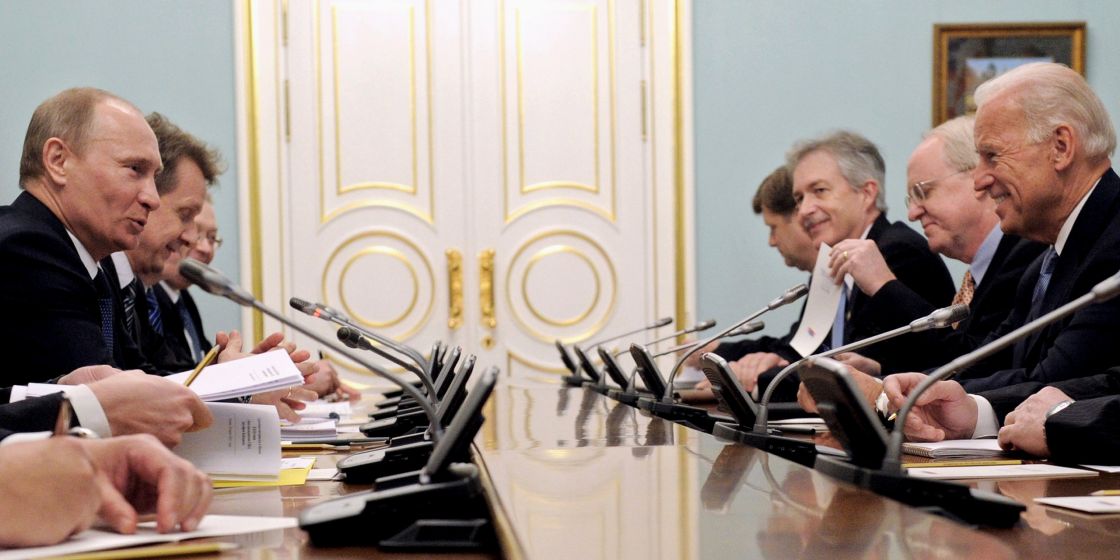- Articles
- Posted
What is Expected of the Putin-Biden Summit? Generally, and in the Syrian Issue
Numerous readings and analyses have started to abundantly appear, about the Putin-Biden summit, which may be held sometime next month. The fact is that many details about this summit are still unknown, including the venue (which was said to be a third country, meaning neither in Russia nor the US), its date (next month is an approximate timeframe that has been indicated without specifying a specific day), and perhaps the most important unknown detail about this summit is whether or not it will actually happen.
In the context of the tremendous tension and escalation that our nuclear-armed world is experiencing, it is not hard to expect that a US-Russia summit, even another US-China summit, and perhaps a triple one, are matters that will inevitably happen at some point during Biden’s term. In fact, the amount of the massive escalation indicates that these summits will be held before too long.
Less than two months ago, during an interview on March 16, US President Joe Biden answered the journalist interviewing him with “yes” when asked whether he agrees that Russian President Vladimir Putin is a “killer”. A few days later, the latter responded with an amusing recorded message in which many saw personal mockery of Biden’s mental health condition, but in actuality it was a mockery of the mental health of the US system that makes statements of the type that Biden made. In response, Putin challenged his American counterpart to have a face-to-face debate. Nearly two weeks ago, Biden invited Putin to hold a bilateral summit.
“Tough” Biden and “Lenient” Trump
Although there is a “conviction” established by Western media, which says that Trump was “lenient” with the Russians. However, formally, the first summit between Trump and Putin took place more than a year and a half after Trump took office, in Helsinki on July 16, 2018. In Biden’s case, if the summit is actually held next month, then will take place only five months after taking office.
Could this difference mean anything? In other words, can anything be construed based on how quick this talk about a bilateral summit is compared to the last one?
We believe that this difference is important and is not just a formal one. Usually, diplomatically among countries, especially the major ones, particularly during crises and tense periods, holding a summit at the level of heads of state between any two countries can only take place after accomplishing quite a bit of mutual understandings on most of the basic issues of common interest. The actual meeting between the two heads of state would then be a sort of “blessing” of agreements that have already been reached. Of course, the matter is not devoid of sticking points of great importance that have not been resolved by the technical teams on both sides; such points will be placed on the table for the two heads of state to settle if possible.
In other words, during periods of mutual escalation, states theoretically face three possibilities:
1. Escalating towards war, which is an impractical possibility in this case, and it is no longer a possibility for the US military-wise. This is according to the testimony of its former defense secretary before the US Congress, as Russia has far more than enough to deter.
2. Maintaining a controlled degree of escalation for a long period of time, or the so-called finger-biting policy (to see who gives in first).
3. Escalating very intensely and rapidly, without getting to the point of war, as a prelude to reaching a quick understanding, which is sometimes called the brinkmanship policy.
If we try to classify the assumed summit within these possibilities, it corresponds most closely to the third possibility. The first possibility is refuted, and the second contradicts the holding of a summit sometime soon, and also contradicts the speed and intensity of escalation, and is more in line with continuing the escalation and postponing the summit for at least a year or two.
The way the Biden administration worked during the four months since it took office with regards to the relationship with Russia, fits perfectly with the third possibility: a rapid escalation of all files in preparation for a speedy agreement.
The escalation included diplomatic aspects (expelling diplomats, non-diplomatic rhetoric, etc.) and economic aspects (across-the-board economic and financial sanctions, including the Nord Stream Pipeline and third parties dealing with Russia, especially European ones). The escalation included even military aspects (announcing maneuvers on the Russian frontiers, mobilization of forces on the border from the direction of Ukraine, and many others).
As for the geographical spread of the escalation, it can be said that it covered most of the globe from the North Pole to the South Pole, and from Latin America to Siberia, not to mention space and the arms race therein.
Why the Rapid Escalation
We believe the Biden administration’s implicit target was, from the outset, attempting to reach an understanding with the Russians. The essence of the matter is that the ruling elite in the US, despite its deep division, agrees at the minimum that it is necessary to prevent China and Russia from standing on the same side against the US, and if this is not possible then at least one of the two forces should be neutralized.
Since the US sees in China the greatest danger in the economic sense, and sees that the Russian military power, that is a nuclear equivalent to the US, plays in some way the role of an umbrella for China in the international sense within the ongoing conflict, it is imperative to do everything possible to separate the two, or as mentioned above to neutralize one of them, which is Russia.
This is not a new thing for the US, nor for China or Russia, as there is almost a consensus among think tanks, that the collapse of the Soviet Union practically began with the Soviet-Chinese separation and disagreement. However, the lesson was harsh on both sides, so harsh that it could never be forgotten.
Nevertheless, it seems that the US has no choice in the face of the escalation and deepening of its crisis, especially in view of the deepening of the Chinese-Russian work to push the dollar out of wider and wider areas of global circulation.
We believe that it is possible to understand dealing with the Iranian file with almost the same logic. Concentrating efforts towards China requires relieving many burdens, while trying to establish different alignments during the process of relieving the burdens.
Going back to the summit with Russia, if the US was unable to subjugate a country the size of Iran and its economic and military capabilities, then how will it be with a country the size of Russia? Therefore, the explanation for the escalation lies, as we mentioned above, is an attempt to relieve certain burdens and an attempt to create alignments within which the US is not isolated.

Syria and Ukraine
The files contested between Russia and the US are many, but the Syrian and Ukrainian files are of a very special importance.
We can recall that the logic of the US elite and that of the establishment in the US, and within the framework of criticizing Trump and his policies, that logic was based on a simple and correct idea: We should not lose our historical allies simply because of reckless behavior. The implicit logic is: Our biggest struggle is with China, the economic giant, and with Russia within the framework of its relationship with China and within the framework of its steadily expanding role. Within this struggle we (the US) should recruit all the Western powers behind us, not to mention the need to create deep fissures in the ranks of the enemies. What a miserable situation we have reached (as Americans), because the ranks of the enemies are getting stronger while ours are wobbling.
Going back to Syria and Ukraine, among the sides involved in these two crises, directly or indirectly, are the US’s most important historical allies: Europe, the Arab Gulf states, Turkey, and the Zionist entity.
These two crises continue in parallel with the US’s inability to achieve anything therein except prolonging them, and harming its historical allies, lose their confidence, and undermine their historical alignment. For example, Turkey, the Arab Gulf, and some European countries have been raising their voices by objecting to the US boss.
This means that the US appraisal may have reached the following limits: Either we admit having lost in Syria and Ukraine, and we try to find a face-saving formula through dialogue with Russia; or we keep the two crises burning and risk not only losing Syria and Ukraine in the medium term, but also losing our most important historical allies because of Syria and Ukraine. We believe that dealing with Iran and its nuclear file is similar in its in-depth logic.
Again, Why the Rapid Escalation?
The perception we presented above revolves around a basic idea of how the US is trying to manage the retreat in the strategic sense within the framework of the conflict with the rising powers, in the hope of delaying the retreat and creating appropriate opportunities to reverse it if able to do so.
However, there is also something to be said about the form of retreat, and rather about the way the play was directed: the major escalation against Russia during the past four months, which may continue for a few more months, ensures two things:
First, unifying the internal US ranks. It should not be forgotten that the deep division that appeared at the end of last year and the beginning of this year has not disappeared, rather it is still alight under the ashes. Additionally, the massive escalation in the external sense has always been one of the most important tools of the various regimes in exporting and covering up their internal contradictions. Therefore, the militaristic rhetoric may be useful in this context.
Second, and the most important thing is that, in our opinion, the decision to concede to Russia in a few major files, including Syria and Ukraine, has already been taken, and the militaristic rhetoric we see by the US are the thick smoke bombs to cover up the concessions that will be made before too long.
We have to pay attention to what the Zionist’s research centers say in this field, and look at what Jeffrey says because he does not address us with his recent frenzied activity, but seeks to support the opinion that he, Bolton, and others carry, which says that it is not permissible to concede to Russia. Their point of view might be based on that what will happen is that the US will concede to Russia and will not be able to defeat China, and thus will accelerate the loss of its global role.



 Saad Saeb
Saad Saeb